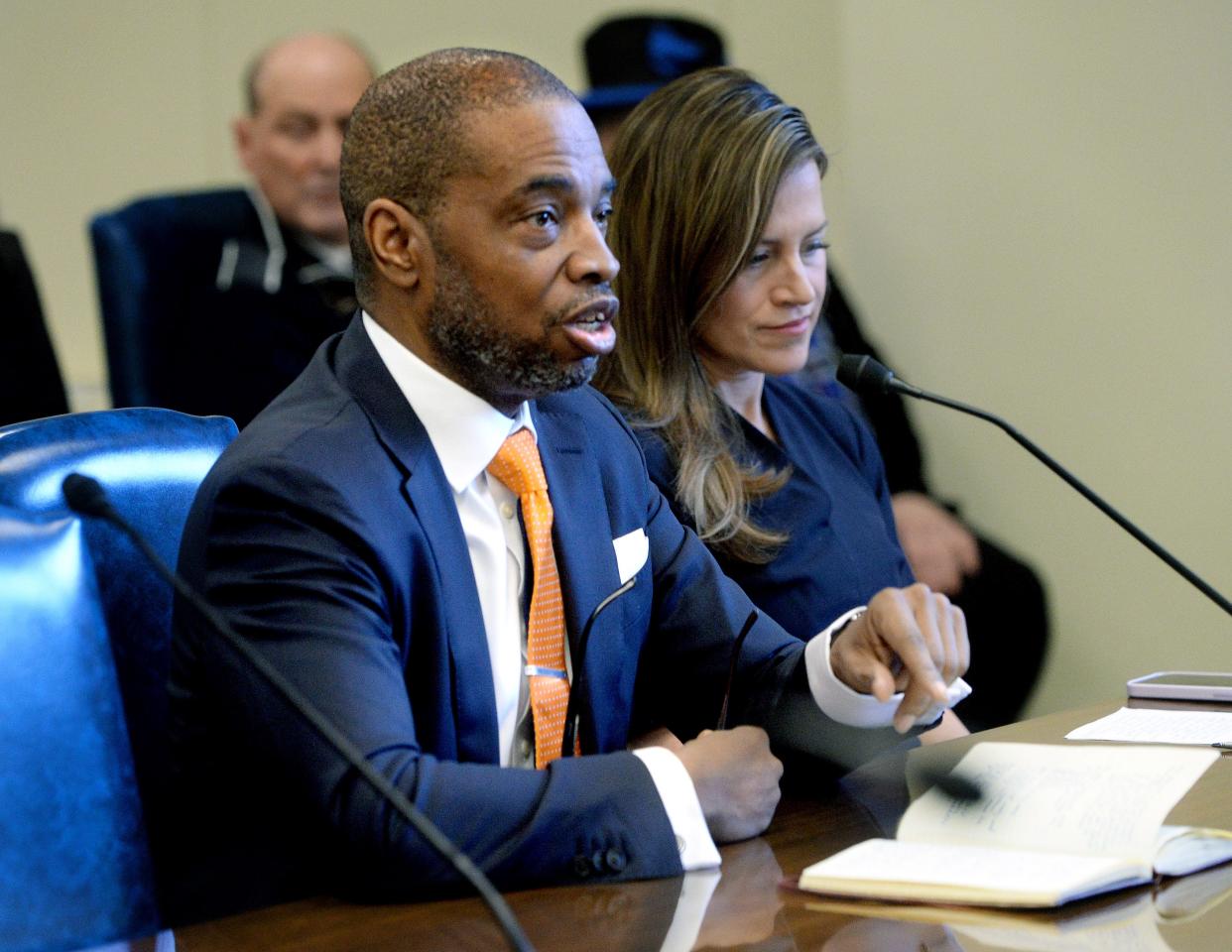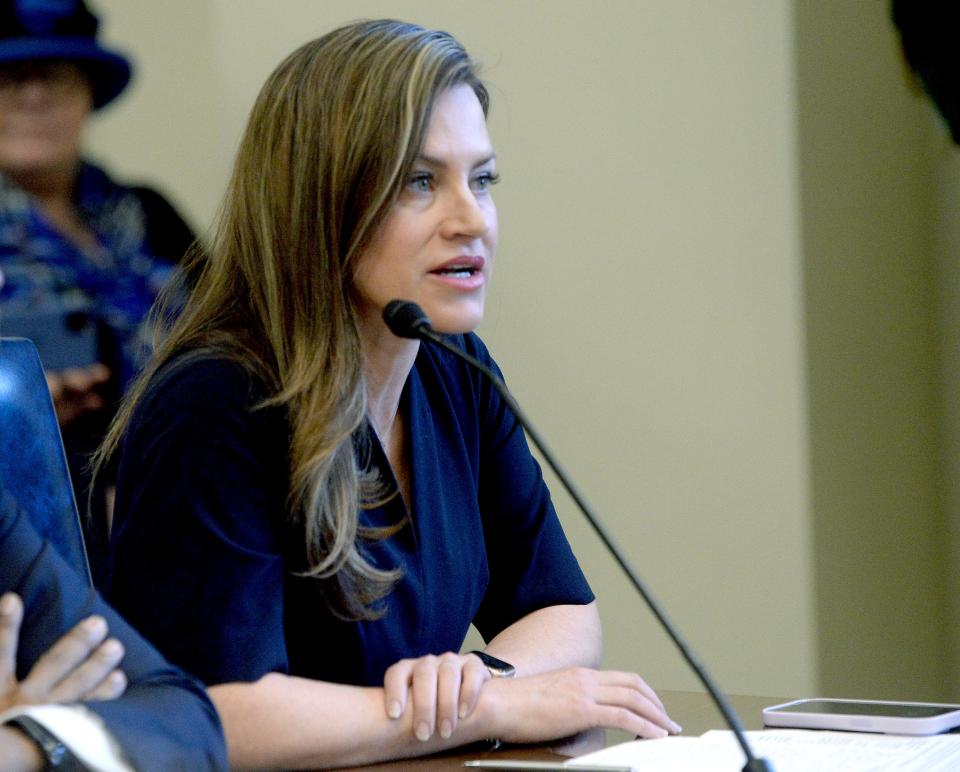Illinois lawmakers consider two bills establishing rank choice voting. How does it work?

When voters cast their ballots in the upcoming April election, they will, in nearly all Illinois communities, select one candidate per race. That could change under legislation proposed in the Illinois General Assembly.
At a House Ethics and Elections Committee hearing this week, two bills were discussed that would bring ranked choice voting to the state. The format, where voters select a first, second, third, and so forth candidate, has gained traction recently in states such as Alaska.
Election Buzz:The consolidated election is April 4. Here's what you need to know about casting a ballot
Evanston, home to Northwestern University, became the first city in the state to adopt RCV. A November referendum passed overwhelmingly and would apply to municipal races.
The bills - House Bill 2807 from state Rep. Maurice West, D-Rockford, and House Bill 3749 from state Rep. Kam Buckner, D-Chicago - focus on presidential primaries, and municipal and township office races respectively.
Former Colorado House Speaker Terrance Carroll, now a senior fellow at FairVote, a national nonprofit promoting RCV and election reform, told lawmakers the system would benefit voters in Illinois and nationwide.
Carroll promoted RCV as a way to move past personal attacks commonplace in political campaigns and instead focus on the issues. He said assertions that the elderly and people of color would not understand the process were false and offensive.
"For someone who has been involved in party politics, probably far longer than I should have been in my life, it also helps promote more viable candidates who are running for office," he said, serving as the first Black House Speaker in Colorado from 2003 through 2011. "So, it tends to mitigate against the most extreme candidates in both parties.
Opponents have submitted more witness slips than proponents on both bills as of Wednesday. Among them is Andy Bakker, representing the Illinois Opportunity Project and Stop Rank Choice Voting Coalition in Illinois, who spoke to the committee on Tuesday.
RCV would be a "radical change" to the way Illinoisans vote, and he questioned the benefits Carroll mentioned.
"At the end of the day, rank choice voting is a scheme to disconnect elections from issues and allows candidates with marginal support to win," Bakker said. "It obscures true debate and issue-driven dialogues among candidates and eliminates genuine, true binary choices."
How does it work?
Instead of one choice, voters in a ranked-choice system select their first choice among a list of candidates and then choose their subsequent second, third, and potentially fourth options.
Under RCV, a candidate automatically wins if they receive a plurality of votes as a first choice. However, in cases such as the recent Chicago mayoral race where no candidate secured a majority, an elimination process would begin.
The candidate with the lowest number of votes would be eliminated and each of their votes reallocated to their supporters’ second choice candidate. The process would repeat until one candidate secured more than 50% of the votes.

Amber McReynolds, a senior political strategist with Issue One, said that based on RCV data from states such as Alaska, New York, and California that already use RCV, voter turnout has improved while helping to manage a large field of candidates.
"This is a better voting model to ensure all voices and choices are reflected in the election results," she said, an Illinois native also visiting from Colorado.
What counties are prepared to implement?
Neither HB 2807 nor HB 3749 have effective dates nor have been moved out of committee, but McReynolds thinks if passed, the legislation could be quickly implemented.
More than 80% of Illinois voters live within a jurisdiction that has the systems and software to use RCV, she said. But more than a third of counties would require updates.
State Rep. Dennis Tipsword, Jr., R-Metamora, raised concern about the expense of updating election systems for rural counties.
Julie Bliss, county clerk in Boone County, told committee members part of the increased expense is that ballots will be larger. It also depends on what voting software is used. Bliss added every Illinois county has a separate contract with voting companies.
States such as Vermont, Georgia and Rhode Island that have statewide contracts reduce costs and give voters a more uniform experience regardless of county, she said.
The expense estimated for Boone County, home to about 53,000 residents, ranges from $35,000 to $45,000 to purchase the needed software upgrade, she said.
County:Sangamon County associate judge confirmed for federal court
Sangamon County Clerk Don Gray confirmed an upgrade to the county's Election Systems and Software would cost about $1.8 million. However, a system upgrade only would be part of the expenses, he said. Sangamon County also would need to account for increased printing costs due to larger ballots, certification with state and federal election authorities, a software update, and educating the public on what RCV means.
Aggregating election software at the state level could help with costs, but Gray said he would like to know what that means for security measures. He also noted that counties such as Cook which uses Dominion Voting Services for its tabulation, have different needs and financial abilities when it comes to elections.
"The decentralized factor of how we operate today is a great security feature, especially in the age of cybersecurity.
"Our opponents that would like to be nefarious to the system ... have to access multiple points instead of a single, universal centralized system."
With limited data on the expense, state Rep. Carol Ammons, D-Urbana, urged more research be conducted before the legislature moves forward with RCV statewide. Like Bliss, she also supported a statewide voting system.
"I understand the idea, I understand it works in other places, but I understand our process does not collect the proper data for us to analyze," she said.
Contact Patrick Keck: 312-549-9340, pkeck@gannett.com, twitter.com/@pkeckreporter.
This article originally appeared on State Journal-Register: Illinois House committee considers two rank choice voting proposals

